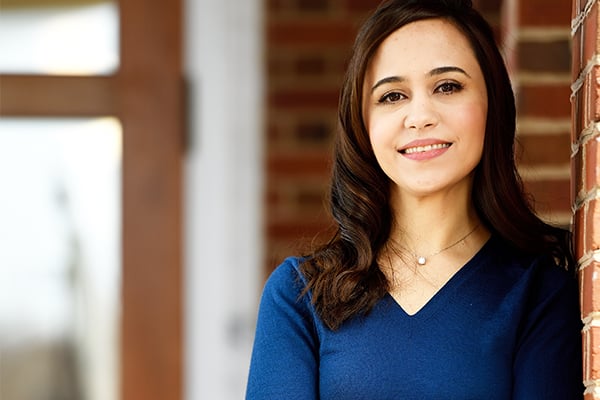Meet Shiva Razavi, BME Ph.D. student

Shiva Razavi is a biomedical engineering Ph.D. student working in the lab of Takanari Inoue, associate professor of cell biology. She is creating a synthetic system to study the network of signaling proteins that control complex cellular functions such as migration and growth.
In an interview with Johns Hopkins Medicine, Razavi shared details of her journey to become a biomedical engineer, the mentors who helped her pursue this career path, and the importance of supporting women in STEM.
Below is an excerpt from this interview.
How did you decide to focus on biomedical engineering?
I have had an unconventional career trajectory. Early on I knew I wanted to pursue engineering. However, I was banned from going to a public university in my native country of Iran because my family was a Bahá’í religious minority. My only choice was an underground and “illegal” university called Bahá’í Institute for Higher Education (BIHE) where I studied for a year before I left Iran as a refugee in 2001. Coming to the U.S., I studied mechanical engineering at University of Illinois, Urbana-Champaign, then worked for the automotive industry. There, researching car brake design brought me in contact with literature on modeling of myocardium heart tissue that shares viscoelastic material properties with brake pads! Fascinated by the interplay between engineering and biology, I decided to formally pursue bioengineering. I first worked as a research assistant at Harvard Medical School for over two years before starting my Ph.D. in biomedical engineering at Johns Hopkins.
Who or what helped you pursue your career path?
I have been fortunate to cross paths with individuals who took a risk on me. My physics professor, Mr. Mahmoud Badavam, a 1978 MIT graduate, spent four years in an Iranian jail for teaching us physics at the banned BIHE. Dr. Anjana Rao and Dr. Patrick Hogan at Harvard trained me in experimental biology that would have otherwise been beyond my reach. My Ph.D. adviser, Dr. Inoue, has provided academic support and freedom, allowing me to locate my own niche. Lastly, I am forever grateful for the U.S., giving me the opportunity to get a world-class education and to dream.
Who are your historical or contemporary heroes?
There are many inspiring women who have broken the glass ceiling, but the successful female figures around me inspire me more tangibly. Through the opportunity to interact with these individuals, I learned how their high ethics, intellect, rigor, and kindness have come together to shape their success. Within Johns Hopkins, I can name Dr. Carol Greider, Dr. Erin Goley and Dr. Kathleen Cullen.
What message do you have for the Hopkins community about serving and supporting women?
Success is not finite, and when it is shared, it can cast light on more people and have a broader reach. We will all live in a more peaceful and productive community if we extend our hands and share our resources to enable others in our community to flourish.
What advice can you give other women pursuing academia or the biomedical sciences?
Trust that you are capable. With integrity, dedicate yourself to any route you want to pursue. There will be countless surprises, and many of them will be pleasant. Yet, the roadblocks are an integral part of any ambitious goal and a great learning opportunity that will make you that much more adept in your next undertakings.
Read the full interview here.
